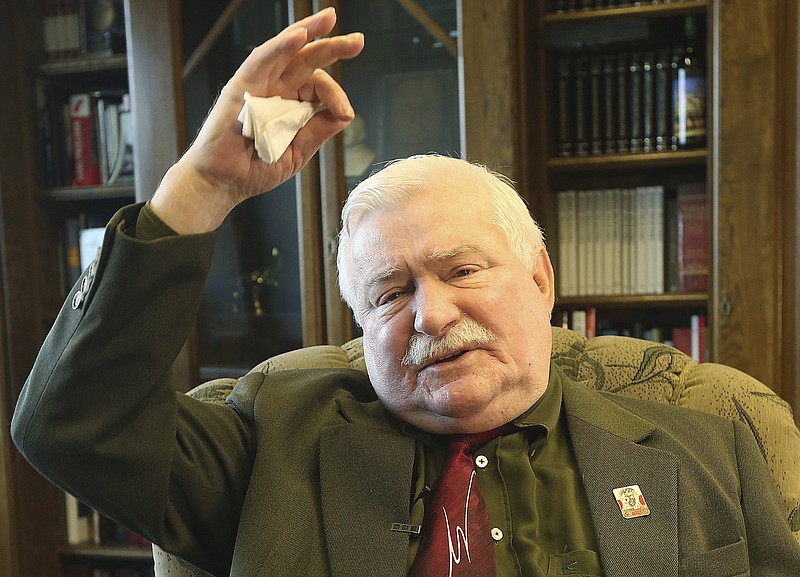WARSAW, Poland (AP) - A Polish state historical institute presented new evidence Tuesday that Lech Walesa, the leader of a peaceful pro-democracy struggle that challenged the communist regime in the 1980s, acted as a paid informant to the communist secret police in the 1970s.
The evidence, based on an analysis of handwriting in documents from secret police files, strengthens allegations that have been known to the public for many years already. While not shocking, the repeated allegations are having the effect of tarnishing the historical legacy of the democracy icon, a man who had long been considered one of the greatest Poles of the 20th century.
The allegations are also convenient to the populist government, which is keen to see Walesa - a harsh critic of the government and ruling party leader Jaroslaw Kaczynski - toppled as a national authority.
The 73-year-old Walesa was away from Poland on Tuesday when a historian, a prosecutor and a forensic expert presented evidence that the handwriting of an agent nicknamed "Bolek" matched that of Walesa, the former president and Nobel Peace Prize winner.
But on Sunday, knowing the evidence was to be released, Walesa spoke out about the matter, insisting, as he has in the past, that he is innocent and that the documents that were analyzed were forgeries. He said it was "tragic" that people believed the allegations and that "the truth is on my side."
The communist-era files indicate that Walesa signed an agreement to collaborate with the secret police in December 1970 and continued his cooperation until he broke it off in 1976. The experts said the evidence also shows that he wrote reports on co-workers who opposed the regime and signed 17 receipts for money.
In 1980, Walesa, a Gdansk shipyard electrician, joined and led a massive strike at the shipyard that gave rise to the nationwide Solidarity freedom movement, which used strikes, rallies and other forms of peaceful civil resistance to win some concessions from the Moscow-backed regime.
After facing setbacks in the 1980s, including the martial law crackdown imposed in 1981, Solidarity eventually helped guide the country's bloodless transformation from communism to democracy. Walesa himself served as the first popularly elected president from 1990-95.
As the evidence against Walesa mounts, even his staunchest defenders aren't making the case anymore that he was innocent.
Instead, they are trying to remind Poles of the difficult choices that people faced during those complicated times, when regime opponents like Walesa were threatened and blackmailed by the secret security services and many well-intentioned people cracked under pressure.
Others stressed that any weaknesses don't change the fact that Walesa eventually - and famously - jumped over the shipyard wall to lead anti-regime protests in 1980. They also noted that it took strength and courage to end his alleged collaboration in 1976, especially with a wife and children to support.
Radek Sikorski, a former foreign minister, thanked Walesa for his defense of the workers at the Gdansk shipyard and his later service to the nation.
"Thank you for leading Poland to freedom without shedding blood," Sikorski tweeted Tuesday. "You are a greater man than your critics."
Ryszard Petru, head of the opposition Modern party, said: "We should remember the good that Lech Walesa has done for Poland. We should remember him as the one who jumped the wall and helped us topple communism."
The evidence is convenient for the ruling Law and Justice party, whose leader, Jaroslaw Kaczynski, is a longtime rival of Walesa's.
Kaczynski and his allies are deeply critical of the agreement in 1989 between Solidarity and the communist regime which brought a peaceful end to communism. They argue that too much influence and wealth was left in the hands of the old guard, and they blame that on Walesa and some of the other former dissidents who were willing to make compromises with the communists.
The documents surfaced last year in the house of a late former communist-era official and became a focus of attention by the conservative government, which welcomed the chance to expose Walesa's past.
Some government critics feel the state historical body that has investigated the files, the Institute of National Remembrance, is overly politicized and is being used as a tool to undermine Walesa's legacy.
The institute's head, Jaroslaw Szarek, said Walesa's alleged collaboration doesn't change the fact that he has a place in Poland's history, though he stressed there were millions of other people in Solidarity, too.
"From today there are no doubts about Lech Walesa's collaboration with the security services," Szarek said. "However, from today a new question can be asked - to what extent did the fact that Lech Walesa started this collaboration in the early 1970s determine his decisions at a later date, in the first 16 months of Solidarity, later in the 1980s, and also after 1989?"
"This is an open question," Szarek said.
